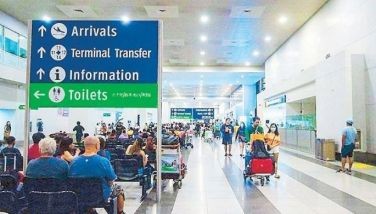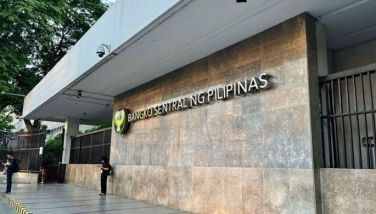Thrift banks seek return to GRT
April 7, 2003 | 12:00am
The thrift banking industry is asking the Department of Finance (DOF) and its line agency, the Bureau of Internal Revenue (BIR), to initiate moves to bring back the gross receipts tax (GRT) environment or else watch the demise of the thrift and rural banking system.
In a letter to the two government agencies, the Chamber of Thrift Banks (CTB) urged that the DOF and the BIR "initiate legislation of the soonest possible time to retain GRT on financial transactions retroactive January 2003, and to defer the implementation of VAT on banks."
The thrift and rural banking system accounts for a mere 10-percent in terms of assets in the entire banking system. But its client base is composed of the middle to lower income bracket in terms of both consumer and business levels nationwide.
In fact, these are exactly the target market of two items of national government’s 8-point economic agenda. These items are promotion of the small and medium enterprises, and jumpstarting medium and low-cost housing.
The CTB argued on the possible deleterious effect on such borrowers considered as the vital engines or drivers of economic growth, the very market base of both the thrift and rural banks.
Of the sector’s total loan portfolio of P153.6 billion as of end September 2002, almost 30 percent or P43.5 billion went to lending to the housing sector.
Thrift banks claim that their credit delivery to the SMEs from 1996 to 2000 reached 42 percent equivalent to P31.5 billion. Some thrift
banks, in fact, allocated more than 90 percent of their total loan portfolio for the SMEs.
"VAT on interest on loan installment payments will negatively affect over 600,000 thrift bank borrowers alone," it said. "For SME borrowers, the 10-percent VAT will substantially affect their competitiveness especially in an environment where cost control means survival in the global market."
It further argued that socialized and low cost housing, a major program of the Arroyo administration, will be adversely affected by real additional costs.
VAT would increase the borrower’s monthly loan installments not to mention the fact that a housing loan borrower pays VAT twice.
"VAT is paid when a house is purchased and another VAT is paid when the buyer pays interest on the said housing loan. VAT on banking transactions is clearly unjust," the CTB said.
The latest tax imposition on the country’s financial system is a pass-on tax. However, consumers like those making housing or auto loans cannot pass on the VAT.
This raises fears that the non-performing loans (NPLs) of the banking system, particularly that of the thrift banking system, would increase as the additional cost created by the VAT would reduce borrowers ability to pay.
"As a government impost, VAT will be paid ahead of interest and principal, resulting in a need for an extension in the length or term of affected loan accounts, as VAT will eat into principal payments of the borrower," it said.
To make matters worse, the country’s banking system fears that numerous disputes would arise between banks and the BIR examiners. That could lead to more administrative appeals and possible judicial actions, which would again become costly and time consuming for banks, the government collecting agency, and the courts.
The CTB likewise pointed out that other countries are not collecting VAT on banking transactions "because tax experts could not agree on a reasonable way of implementing VAT."
Effective January this year, the BIR will collect a 10-percent VAT on the country’s banks. Non-bank financial intermediaries, and finance companies based on Section 5 of Republic Act (RA) 9010. Prior to this, government was collecting a GRT roughly equivalent to just five percent based on gross receipts and not individual transactions.
In a letter to the two government agencies, the Chamber of Thrift Banks (CTB) urged that the DOF and the BIR "initiate legislation of the soonest possible time to retain GRT on financial transactions retroactive January 2003, and to defer the implementation of VAT on banks."
The thrift and rural banking system accounts for a mere 10-percent in terms of assets in the entire banking system. But its client base is composed of the middle to lower income bracket in terms of both consumer and business levels nationwide.
In fact, these are exactly the target market of two items of national government’s 8-point economic agenda. These items are promotion of the small and medium enterprises, and jumpstarting medium and low-cost housing.
The CTB argued on the possible deleterious effect on such borrowers considered as the vital engines or drivers of economic growth, the very market base of both the thrift and rural banks.
Of the sector’s total loan portfolio of P153.6 billion as of end September 2002, almost 30 percent or P43.5 billion went to lending to the housing sector.
Thrift banks claim that their credit delivery to the SMEs from 1996 to 2000 reached 42 percent equivalent to P31.5 billion. Some thrift
banks, in fact, allocated more than 90 percent of their total loan portfolio for the SMEs.
"VAT on interest on loan installment payments will negatively affect over 600,000 thrift bank borrowers alone," it said. "For SME borrowers, the 10-percent VAT will substantially affect their competitiveness especially in an environment where cost control means survival in the global market."
It further argued that socialized and low cost housing, a major program of the Arroyo administration, will be adversely affected by real additional costs.
VAT would increase the borrower’s monthly loan installments not to mention the fact that a housing loan borrower pays VAT twice.
"VAT is paid when a house is purchased and another VAT is paid when the buyer pays interest on the said housing loan. VAT on banking transactions is clearly unjust," the CTB said.
The latest tax imposition on the country’s financial system is a pass-on tax. However, consumers like those making housing or auto loans cannot pass on the VAT.
This raises fears that the non-performing loans (NPLs) of the banking system, particularly that of the thrift banking system, would increase as the additional cost created by the VAT would reduce borrowers ability to pay.
"As a government impost, VAT will be paid ahead of interest and principal, resulting in a need for an extension in the length or term of affected loan accounts, as VAT will eat into principal payments of the borrower," it said.
To make matters worse, the country’s banking system fears that numerous disputes would arise between banks and the BIR examiners. That could lead to more administrative appeals and possible judicial actions, which would again become costly and time consuming for banks, the government collecting agency, and the courts.
The CTB likewise pointed out that other countries are not collecting VAT on banking transactions "because tax experts could not agree on a reasonable way of implementing VAT."
Effective January this year, the BIR will collect a 10-percent VAT on the country’s banks. Non-bank financial intermediaries, and finance companies based on Section 5 of Republic Act (RA) 9010. Prior to this, government was collecting a GRT roughly equivalent to just five percent based on gross receipts and not individual transactions.
BrandSpace Articles
<
>
- Latest
- Trending
Trending
Latest




























